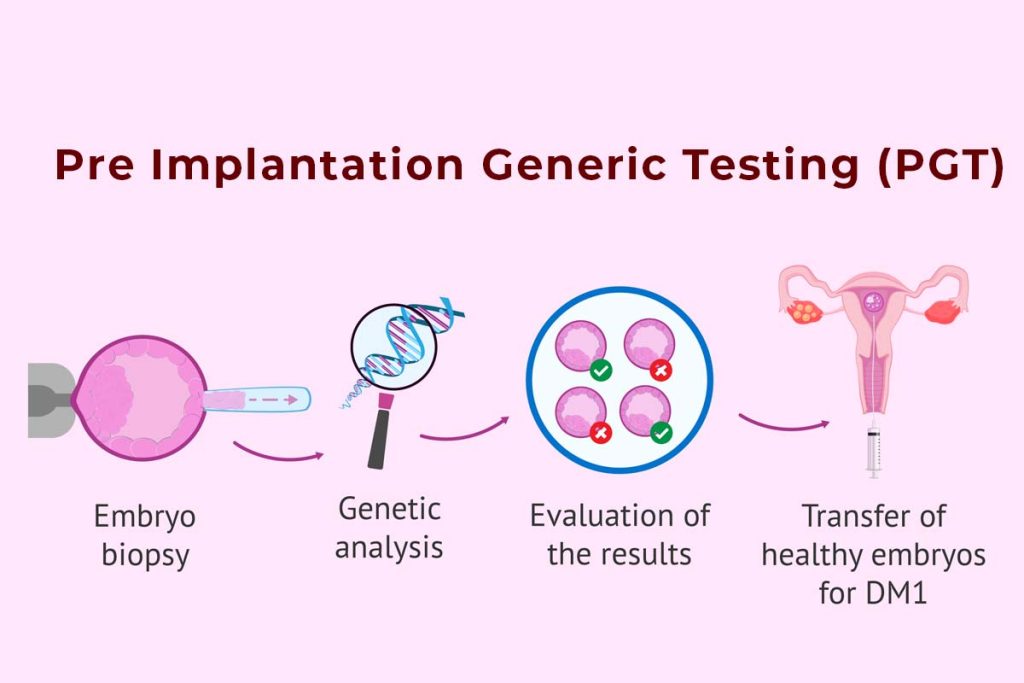
Preimplantation Genetic Testing at a Glance
This article offers a comprehensive insight into Preimplantation Genetic Testing tests available to fertility patients. We delve into PGT-A, PGT-M, and PGT-SR, aiming to boost IVF success rates at our esteemed IVF Fertility Hospital in Guntur. Ensuring the transfer of only genetically healthy embryos is key to successful fertility treatment.
Fertility Through Delivery – IVF Fertility Hospital in Guntur is Here
At Birth Help Center, we provide comprehensive assisted fertility solutions starting right from initial consultations through IVF protocols involving genetic embryo assessments to successful implantation up to delivery and beyond. You can trust us to be your partners at each milestone.
What is Preimplantation Genetic Testing (PGT) for Embryos?
PGT or preimplantation genetic testing enables specialized screening of embryos created through IVF procedures to detect potential genetic anomalies before transfer into the uterus. Selecting and transferring only healthy embryos verified to carry balanced, normal chromosomes increases the chances of successful implantation and live birth.
Preimplantation Genetic Testing for Aneuploidy (PGTA)
PGTA allows identifying embryos carrying an abnormal number of chromosomes in a condition called aneuploidy which is the leading cause of failed conceptions and recurrent pregnancy loss even in younger IVF patients. Testing via advanced NGS-based PGT-A minimizes such losses.
Candidates for PGTA Testing
PGTA helps guide embryo selection to choose euploid ones in patients with advanced maternal age ≥35 years, a history of miscarriages or failed IVF cycles indicating probable undiagnosed aneuploidy issues and severe male factor infertility among others. The test is conducted after retrieval before frozen embryo transfers.
Preimplantation Genetic Testing for Monogenic Disorders (PGTM)
PGTM enables the detection of single gene defects or mutations linked to over 200 hereditary disorders passed down genetically in families – like cystic fibrosis, thalassemias, Huntington’s disease etc. By selecting and transferring only healthy embryos screened negative for the concerned familial disorder, affected parents have improved chances of having children free from the condition.
PGT for Chromosomal Rearrangements (PGTSR)
PGT-SR helps identify embryos having balanced translocations, inversions or other structural rearrangements which makes miscarriage almost a certainty. Skipping transfer of such abnormal embryos with extremely poor prognosis via comprehensive chromosomal assessment prevents painful pregnancy losses later.
How are PGTA, PGTSR and PGTM performed on Embryos during IVF?
Preimplantation Genetic Testing (PGT) is a crucial component of the in vitro fertilization (IVF) process. It allows for the assessment of embryos to identify genetic abnormalities before they are transferred to the uterus.
There are three main types of PGT, each serving a specific purpose:
PGT-A (Preimplantation Genetic Testing for Aneuploidy)
Purpose: PGT-A screens embryos for aneuploidy, which refers to an abnormal number of chromosomes.
Process:
- On Day 0, eggs are fertilized in the embryology lab.
- On Day 5, embryos that have reached the blastocyst stage are biopsied.
- Slow-developing embryos are checked again on the next day (Day 6).
- Any embryos not ready on Day 5 but now developed to the blastocyst stage are also biopsied on Day 6.
- Biopsy samples are sent to the genetics lab for testing.
PGT-SR (Preimplantation Genetic Testing for Structural Rearrangements):
Purpose: PGT-SR detects structural abnormalities in chromosomes, such as translocations or inversions.
Process:
- Similar to PGT-A, embryos are biopsied during the blastocyst stage.
- Biopsy samples are analyzed to identify any structural rearrangements.
PGT-M (Preimplantation Genetic Testing for Monogenic Disorders):
Purpose: PGT-M focuses on specific single-gene disorders (monogenic disorders).
Process:
- Embryos are biopsied during the blastocyst stage.
- Genetic testing is performed to identify mutations associated with the targeted monogenic disorder.
NGS Next Generation Sequencing Now Identifies Mosaicism in Embryos
IVF Fertility Hospital in Guntur can leverage advanced Next Generation Sequencing (NGS) based PGT testing which can accurately identify mosaic embryos. Having a mix of normal and abnormal cells, unlike traditional methods. This enables reliable differentiation between mosaics and uniformly euploid embryos for preferential transfer maximizing viability. Speak to our fertility specialists to learn more!
Embryo Preimplantation Genetic Testing Considerations
While ‘PGT testing’ provides invaluable insights into embryo viability, uterine receptivity, and other factors, they also play a role. PGT cannot guarantee a successful pregnancy but significantly improves odds when combined with high-quality lab procedures. Personalized approach unique to the IVF Fertility Hospital in Guntur! Please call us to schedule your first consultation.
“Don’t let fertility challenges hold you back. Choose a Birth Help Center and open the door to a world of possibilities
Services

With a solid foundation of 7 years of experience, Birth Help Fertility Centre confidently elevates your chances of parenthood using state-of-the-art IVF techniques and technology.
Our Services
Quick Contact
If you have any questions or need help, feel free to contact us for medical assistance.
- +91 9391218214
4/5 Arundelpet, Guntur, Andhra Pradesh,
522007.
©2024 birthhelp.in, All Rights Reserved.

